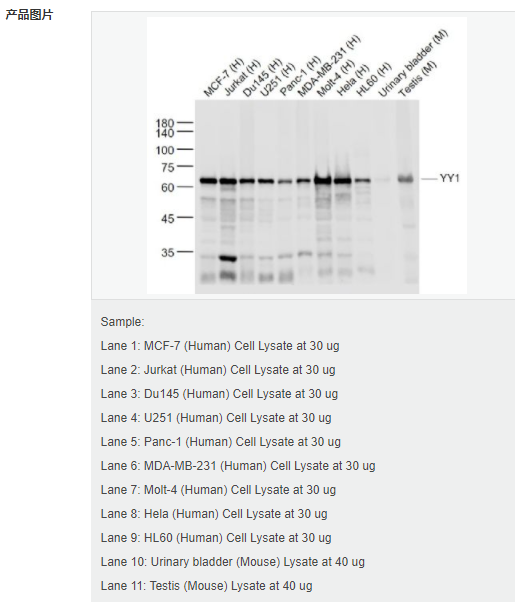

貨號
產(chǎn)品規(guī)格
售價
備注
BN42127R-50ul
50ul
¥2020.00
交叉反應(yīng):Human,Mouse,Rat 推薦應(yīng)用:WB,IHC-P,IHC-F,IF,Flow-Cyt
BN42127R-100ul
100ul
¥3240.00
交叉反應(yīng):Human,Mouse,Rat 推薦應(yīng)用:WB,IHC-P,IHC-F,IF,Flow-Cyt
產(chǎn)品描述
| 英文名稱 | YY1(Nuclear Loading Control) |
| 中文名稱 | 核轉(zhuǎn)錄調(diào)節(jié)因子YY1 (核內(nèi)參)重組兔單克隆抗體 |
| 別 名 | Yin Yang 1; YY1 transcription factor; CF1; Delta; Delta transcription factor; NF E1; NFE1; Transcriptional repressor protein YY1; UCR motif DNA binding protein; UCRBP; Yin and yang 1; Yin Yang 1; Ying Yang 1; YY 1; YY 1 transcription factor; TYY1_HUMAN. |
| 產(chǎn)品類型 | 內(nèi)參抗體 |
| 研究領(lǐng)域 | 細胞生物 染色質(zhì)和核信號 神經(jīng)生物學(xué) 信號轉(zhuǎn)導(dǎo) 細胞周期蛋白 轉(zhuǎn)錄調(diào)節(jié)因子 鋅指蛋白 表觀遺傳學(xué) |
| 抗體來源 | Rabbit |
| 克隆類型 | Monoclonal |
| 克 隆 號 | 5F2 |
| 交叉反應(yīng) | Human, Mouse, (predicted: Rat, ) |
| 產(chǎn)品應(yīng)用 | WB=1:500-2000 IP=1:20-100 IHC-P=1:50-200 IHC-F=1:50-200 ICC=1:50-200 IF=1:50-200 (石蠟切片需做抗原修復(fù)) not yet tested in other applications. optimal dilutions/concentrations should be determined by the end user. |
| 分 子 量 | 46kDa |
| 細胞定位 | 細胞核 |
| 性 狀 | Liquid |
| 濃 度 | 1mg/ml |
| 免 疫 原 | Recombinant human YY1: |
| 亞 型 | IgG |
| 純化方法 | affinity purified by Protein A |
| 儲 存 液 | 0.01M TBS(pH7.4) with 1% BSA, 0.03% Proclin300 and 50% Glycerol. |
| 保存條件 | Store at -20 °C for one year. Avoid repeated freeze/thaw cycles. |
| PubMed | PubMed |
| 產(chǎn)品介紹 | YY1 is a ubiquitously distributed transcription factor belonging to the GLI Kruppel class of zinc finger proteins. The protein is involved in repressing and activating a diverse number of promoters. YY1 may direct histone deacetylases and histone acetyltransferases to a promoter in order to activate or repress the promoter, thus implicating histone modification in the function of YY1. Function: Multifunctional transcription factor that exhibits positive and negative control on a large number of cellular and viral genes by binding to sites overlapping the transcription start site. Binds to the consensus sequence 5'-CCGCCATNTT-3'; some genes have been shown to contain a longer binding motif allowing enhanced binding; the initial CG dinucleotide can be methylated greatly reducing the binding affinity. The effect on transcription regulation is depending upon the context in which it binds and diverse mechanisms of action include direct activation or repression, indirect activation or repression via cofactor recruitment, or activation or repression by disruption of binding sites or conformational DNA changes. Its activity is regulated by transcription factors and cytoplasmic proteins that have been shown to abrogate or completely inhibit YY1-mediated activation or repression. For example, it acts as a repressor in absence of adenovirus E1A protein but as an activator in its presence. May play an important role in development and differentiation. Proposed to recruit the PRC2/EED-EZH2 complex to target genes that are transcriptional repressed. Involved in DNA repair. In vitro, binds to DNA recombination intermediate structures (Holliday junctions). Proposed core component of the chromatin remodeling INO80 complex which is involved in transcriptional regulation, DNA replication and probably DNA repair; proposed to target the INO80 complex to YY1-responsive elements. Subunit: Interacts with YAF2 through the region encompassing the first and second zinc fingers. Component of the chromatin remodeling INO80 complex; specifically part of a complex module associated with the DBINO domain of INO80. Interacts with EED and EZH2; the interactions are indicative for an association with the PRC2/EED-EZH2 complex. Subcellular Location: Nucleus matrix. Note=Associated with the nuclear matrix. Post-translational modifications: Transiently poly-ADP-ribosylated by PARP1 upon DNA damage, with the effect of decreasing affinity of YY1 to its cognate DNA binding sites. Similarity: Belongs to the YY transcription factor family. Contains 4 C2H2-type zinc fingers. SWISS: P25490 Gene ID: 7528 Database links: Entrez Gene: 7528 Human Entrez Gene: 22632 Mouse Omim: 600013 Human SwissProt: P25490 Human SwissProt: Q00899 Mouse Unigene: 388927 Human Unigene: 3868 Mouse Unigene: 458511 Mouse Unigene: 95861 Rat Important Note: This product as supplied is intended for research use only, not for use in human, therapeutic or diagnostic applications. |
